Image source: Radio Liberty
In this week’s issue...
Ukraine Latest: Decisive Battles for Bakhmut in the Spotlight

OP-ED: Let’s Keep a Low Profile for a Change!
POLITICS PAGE 4
CSCE Senior Policy Advisor Michael Hikari Cecire on Georgian Dream’s Chance to Turn It Around
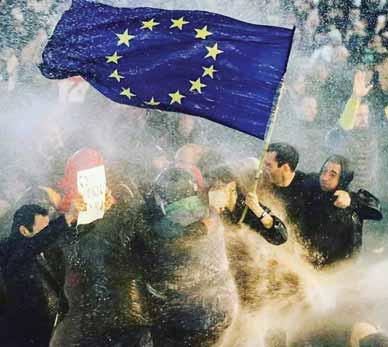
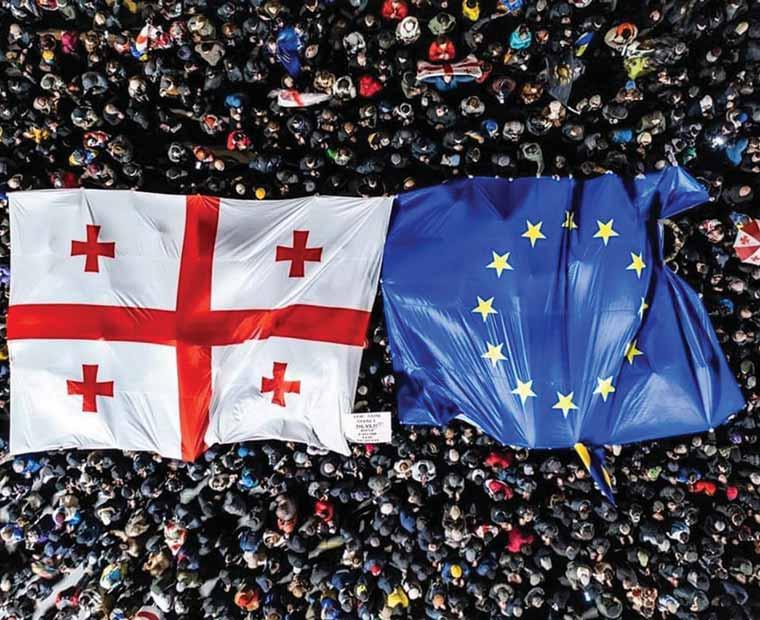
POLITICS PAGE 5
FOCUS
ON THE PROTESTS
Parliament’s discussion of the draft laws on ‘agents of foreign influence’ sparked a wave of protests among Georgian society this week PAGE 2
Georgia’s Maidan: The First Clashes of a Larger “War”
BY MICHAEL GODWIN
The situation in the country has become more volatile than ever, following the introduction of the planned and controversial “foreign agents” bill. Reactions of criticism from the United States, various European Union leaders, and an overwhelming number of public and private figureheads in Georgia itself have demanded its withdrawal. Despite this, the ruling party and the bill’s authors have stood their ground, until now.
After two nights of some of the most violent protests to rock the capital in over a decade, multiple reported arrests, injuries on both sides of the line, and damaged property, the bill now seems dead in the water.
According to the Ministry of Internal Affairs, 133 people were arrested between the two nights.
“The employees of the Ministry of Internal Affairs, as a result of operational measures and investigative actions carried out on March 7-8 of this year, on the facts of law violations that occurred during the protest action held in the vicinity of the Parliament, in particular, on the fact of the attack on the policemen, under Article 353 Prima of the Criminal Code of Georgia, one person In accordance with Articles 166 and 173 of the Code of Administrative Offenses, a total of 133 persons have been arrested,” the ministry reports.
POLITICS PAGE 3 Continued on page 2
Source: AFP via Getty Images
"Something Delicious"Carrefour Congratulates Mothers on March 3 with a Unique Book of Recipes
BUSINESS PAGE 9
Georgia: Still Struggling to Shake off the Memory of Josef Stalin
SOCIETY PAGE 10
The Expat Lifestyle: Judoka Tania Morgenstern, Cancer Survivor and Inspiration to Many, on her Journey to Self-Mastery

SOCIETY PAGE 11
PreparedforGeorgiaTodayBusinessby
Issue no: 1389 • • MARCH 10 - 16, 2023 • • PUBLISHED WEEKLY
PRICE: GEL 2.50
Parliamentary Majority to withdraw Draft Law on 'Transparency of Foreign Influence' after Public Outcry and Riots
we will better explain to the public what the bill was for and why it was important to ensure transparency of foreign influence in our country. To do this, we will start meetings with the population and let the general public know the truth about each and every detail of the matter.
“We act with the special responsibility that, as a ruling power, we owe to each member of society.
“Georgia will maintain peace and stability and continue moving towards Europe with dignity, which is the principle choice of Georgian society,” the statement said.
The EU Delegation welcomed the decision.
“We welcome announcement by the ruling party to withdraw draft legislation on “foreign influence.”
“We encourage all political leaders in Georgia to resume pro-EU reforms, in an inclusive and constructive way and in line with the 12 priorities for Georgia to achieve candidate status," the Delegation said in a statement.
According to the decision of civil activists, the rallies on Rustaveli Avenue will continue.
Tsotne Koberidze, member of the Tbilisi City Council from the ‘Girchi - More Freedom’ party, noted at a joint briefing on Thursday that they will demand clarity from the ruling team on how they are going to withdraw the so-called draft law on agents.
Civil activists are also demanding the release of the detained protestors.
sparked a wave of protests among Georgian society this week, with claims that the adoption of such a law will hinder democratic processes and the country’s Euro-Atlantic aspirations.
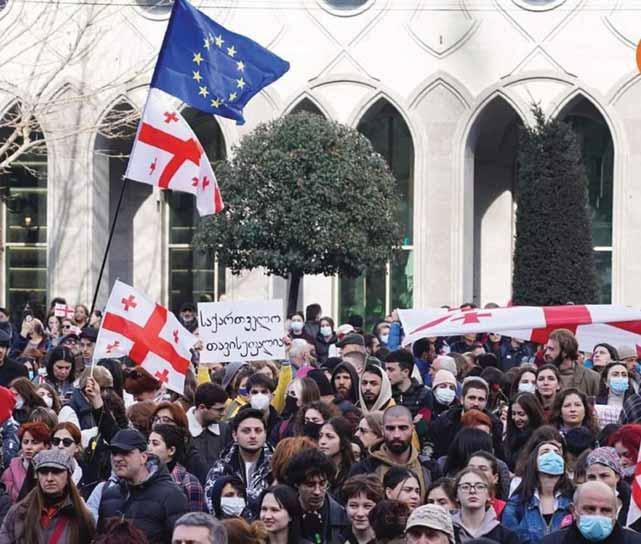
For several days, citizens, representatives of various media outlets and NGOs have been gathering in front of the Parliament building on Tbilisi’s Rustaveli Avenue in protest at attempts to adopt what they call a “Russian law.”
The situation was also tense inside the Parliament building, where several cases of physical and verbal confrontation took place between opposition and the ruling party MPs during the discussion of the above draft laws.
The police used tear gas, water cannons and pepper spray in repeated attempts to disperse the protesters on March 7 and 8, especially when some individuals began throwing molotovs, bottles and other objects at them and vandalizing the parliament building. Both citizens and law enforcement officers were injured.
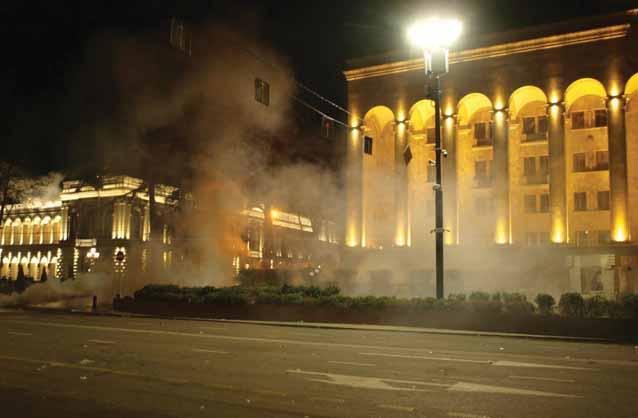 BY ANA DUMBADZE
BY ANA DUMBADZE
Following fierce non-stop protests around the country this week, Georgia’s parliamentary majority announced it had decided to withdraw the draft law “On the Transparency of Foreign Influence”.
“As a ruling power responsible to each member of society, we have decided to unconditionally withdraw the bill we supported, without any reservations,” read the joint statement of the political
council of Georgian Dream, People’s Power and the parliamentary majority, released Thursday morning.
“We see that the adopted draft law has caused differences of opinion in society.
The machine of lies was able to present the bill in a negative light and mislead a certain part of the public. The false label of ‘Russian law’ was attached to the draft law, and its adoption in the first reading was presented as a departure from the European course in the eyes of a part of the public.
“In addition, the radical forces were able to involve youth in illegal activities. We thank the heroic law enforcement
officers who responded to the violence with patience and the highest standards.
“We should be most careful about peace and economic development in our country, as well as Georgia’s progress on the path of European integration. Therefore, it is necessary to spend the energy of each of our fellow citizens not on confrontation, but on the development of the country in the right direction.
“Considering all of the above, as a governing power responsible to each member of society, we have decided to unconditionally withdraw the bill we supported, without any reservations.
“As the emotional background subsides,
"There are many young people who do not trust Georgian Dream and who believe that we, the people, are the guarantor of the country becoming a part of the West. We demand two things: We need clarity on how they intend to withdraw this law, because their statements are vague, they cannot be trusted. And that those people who stood by us, fought with us and are now detained, are released. Until they are freed, Georgian Dream should not think they are off the hook. We will not stop until Georgia takes a guaranteed pro-Western course," Koberidze said.
Parliament’s discussion of the draft laws on ‘agents of foreign influence’
On Tuesday and Wednesday, the rallies were initially carried out relatively peacefully (for around 12 hours Tuesday and seven on Wednesday) in front of the legislative body, with speeches being given, flags waved, chants of “No Russian law!” shouted out, and the national anthem sung. Tensions were heightened on Tuesday night when rally participant and ‘Strategy Builder’ party MP Giorgi Vashadze called on the protesters to surround Parliament and blockade the entrances. Riot police filled both roads beside the parliament building and eventually pushed back the crowds with water cannons, pepper spray and sheer force of numbers. A repetition of the violence and back-and forward pushing was also seen throughout Wednesday night.
The employees of the Ministry of Internal Affairs detained 133 individuals on violations that occurred during the manifestation. At time of going to press, 66 individuals are still being held, among them ‘Girchi – More Freedom’ leader Zurab Japaridze.
Release of the detained protesters will be one of the main demands of subsequent rallies on Rustaveli Avenue.
Georgia’s Maidan: The First Clashes of a Larger “War”
Continued from page 1
The violence seems to have achieved its mission. Georgian Dream, together with People’s Power party, released a statement that said the bill has been rescinded. “We have decided to unconditionally withdraw the bill we supported without any reservations,” they announced in a joint statement on their website. This victory, bittersweet as it is, is unlikely to be the last time the ruling party and the people are forced to square off in the public arena.
Russia’s hand in the internal affairs of Georgia is virtually agreed upon by those who observe the geopolitics of the South Caucasus. The majority of the debate focuses on the severity and level of control the Kremlin has over the actions of certain political entities. Georgian Dream, despite being called pro-Russian by many in the opposition, has also leveled similar accusations against opposition members themselves.
The Russian “boogeyman” in Georgia is not a strawman or false enemy. There is plenty of interest for Russia to maintain control in the region for them to invest the resources to keep the area calm. However, one facet of this has been the relationship between law enforcement and the ruling party.
The parallel between the Ukrainian Berkut, special police trained in brutal repression tactics, and the “spetsnazi” or Georgia’s own special police has been drawn. Their brutal and unprofessional treatment of both press and protestor
alike was on display on both nights. Press officials, clearly marked and conducting themselves in the course of their reporting, were accosted and harassed, even assaulted on a few occasions by unruly police.
While the rank-and-file police officer
is unlikely to be directly influenced by any of the larger politics, the leadership and commanders would be easy to control for someone with the right political power and influence. Similar to the Berkut, holding their high police rank, potential financial benefits, and other blackmail
over the heads of these commanders would instantly turn them into pawns. By the very nature of this mechanism, their professional future in law enforcement would be tied at the hip to the political survivability of the party in control.
Georgian Dream chairman Irakli Kobakhidze thanked the police “for their patience and acting in accordance with the best human rights standards.” He also called the opposition “spies” and blamed them directly for organizing the violent acts, scuttling the possibility of mending ties and a return to normalcy. He also targeted EU leaders who have worked tirelessly to support Georgia politically, financially, and geopolitically.
“We won’t act by the agenda of the radicals and [Member of the European Parliament] Viola von Cramon; we will act in the interests of Georgian society,” he proclaimed. He went on to say that the Euromaidan protests in Ukraine in 2014 were not the same. According to Kobakhidze, the Maidan movement only brought war, destruction, and a loss of Ukrainian territory to Russia. “Ukraine lost Crimea and big parts of Luhansk and Donetsk, and today’s big war in Ukraine is the continuation of that.” While he is obviously not spending any money on a hair dresser, perhaps some of his monthly pay could be used on geopolitics studies.
Finishing up, he said that the people have not dissuaded his party from pursuing another form of the foreign agents’ bill aimed at “funding transparency.” This is likely a nod to the next iteration of their attempt to censor and disrupt opposition and any organization that is deemed excessively onerous to the plans of his party. As a result, the proverbial and literal battle has been won, but the political war has only just started.
GEORGIA TODAY MARCH 10 - 16, 2023 2 NEWS
A massive cloud of CS gas looms over the square in front of Georgia’s Parliament building. Photo by Mike Godwin
Ukraine Latest: Decisive Battles for Bakhmut in the Spotlight
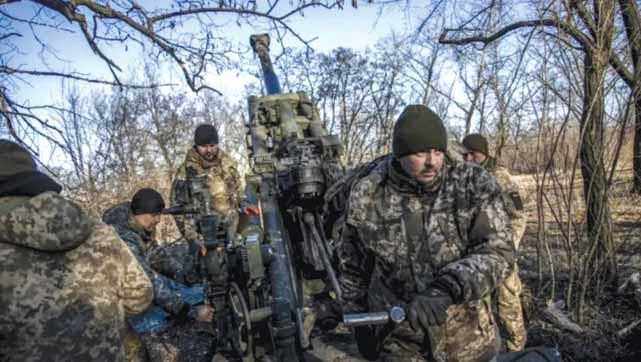 COMPILED BY ANA DUMBADZE
COMPILED BY ANA DUMBADZE
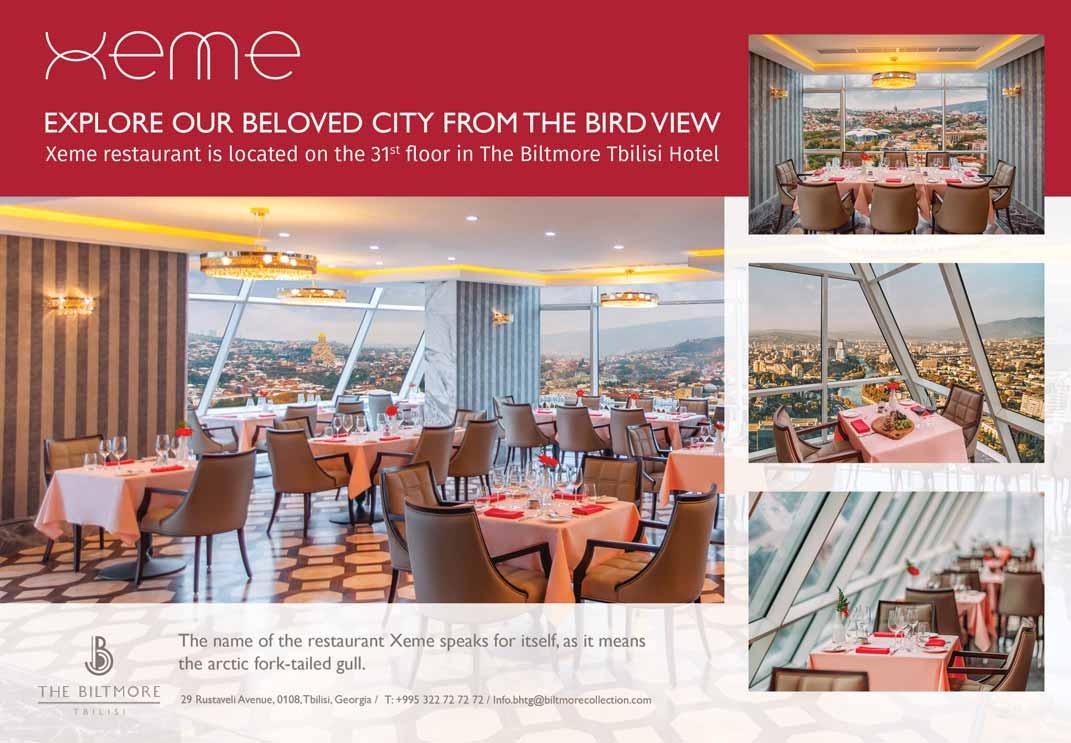
The battle of Bakhmut continues to dominate news out of Ukraine this week, with all eyes on the fate of the city in Donetsk in eastern Ukraine.
The leader of Russia’s mercenary forces fighting in Bakhmut said Wednesday that his private military company, the Wagner Group, had taken full control of the eastern part of the city. The claims have yet to be verified.
Ukraine gave a military update Wednesday in which it noted that Ukraine had repelled over 100 attacks on the Donetsk region over the past day, including on Bakhmut. But it said Russian forces were “continuing their unsuccessful offensive operations” in the area.
The small toen of Chasiv Yar, 5 kilometers from Bakhmut, is one of the last towns around the city still under the control of Ukrainian forces. As so, it has become a hub for the resupply and the movement of troops. It has suffered several attacks by Russian artillery in recent days.
RUSSIA UNLEASHES ANOTHER WAVE OF MISSILE STRIKES ON UKRAINE, OFFICIALS SAY
Kyiv and other major cities in Ukraine, including Lviv, Kharkiv and Odesa, were hit by a wave of Russian missile strikes overnight Wednesday, Ukrainian officials said, with air raid alerts activated across much of the country
in the early hours of Thursday.
The Mayor of Kyiv, Vitali Klitschko, said the capital had been hit by a number of explosions that had damaged energy infrastructure and injured several civilians.
In his most recent post on Telegram Thursday morning, Klitschko said that due to emergency power outages after the missile attack, 40% of the capital’s residents were without heating.
The air alert lasted almost seven hours in the capital, Serhii Popko, head of the Kyiv city military administration,
said on Telegram, accusing Russia of unleashing “almost all types of air weapons,” from Iranian-made drones to “almost all types of cruise missile.” Popko said preliminary information indicated that Kh-47M2 Kinzhal missiles (a nuclear-capable, Russian airlaunched ballistic missile) had hit an infrastructure object. CNBC wasn’t able to verify the claims.
Officials in the southern port of Odesa, Lviv in western Ukraine, and Kharkiv in northeastern Ukraine, all reported missile strikes overnight, while in the
Dnipro area, a regional official said there was “serious destruction” as a result of the shelling, with “energy infrastructure and industrial enterprises” damaged. A number of fatalities have been reported in Lviv and Dnipro. The governor of the northeastern Kharkiv region, Oleh Syniehubov, said Ukraine’s second-largest city Kharkiv had seen around 15 strikes on the city and region. “Objects of critical infrastructure are again in the sights of the occupiers,” he said, adding that “information about the victims and the scale
of the destruction is being clarified.”
Residents in the area have been told to remain in shelters.
In return, Ukraine’s military said Thursday that in the past 24 hours, it carried out a series of missile strikes on separate areas where there was a high contingency of Russian troops.
Ukraine also said that it shot down one unmanned aerial vehicle, destroyed a Buk-M1-2 anti-aircraft missile system and three Russian warehouses storing fuel and military supplies.
The Ukrainian armed forces said that Russian troops carried out “22 airstrikes and 29 attacks from rocket salvo systems.”
“In particular, they used one unmanned aerial vehicle of the Shahed-136 type, which has been eliminated,” Ukraine’s military said, referencing an Iranian drone supplied to Russia.
UN AND RUSSIA TO TALK ABOUT GRAIN DEAL RENEWAL NEXT WEEK IN GENEVA
Top UN trade official Rebeca Grynspan will meet senior Russian officials in Geneva next week to discuss extending a deal that allows the Black Sea export of Ukraine grains amid Russia’s war in the country, a UN spokesperson said on Wednesday.
“That’s the next step, and we’ll see whether anything further is needed than that,” deputy UN spokesperson Farhan Haq told reporters.
“The Secretary-General will continue to do all he can to remove obstacles to the export of Russian fertilizers.”
The deal is set to expire later this month.
GEORGIA TODAY MARCH 10 - 16, 2023 3 POLITICS
Image source: Anadolu Agency, Getty Images
Let’s Keep a Low Profile for a Change!
eficial than going out in search of trouble, as we did under every previous government, from that roaring era right after the halcyon days of socialist irresponsibility, imposed soviet security, weird communist stability, quasi freedom and feigned independence.
OP-ED BY NUGZAR B. RUHADZE
In the last thirty odd years, Sakartvelo has kept making absolutely unaffordable waves, from the renowned, vociferous slogans of the late 1980s and early 90s about kicking the autocratic Russia out and bringing the democratic West in, to the recent and still ongoing oppositional indooroutdoor dramatics to block a controversial
bill from passing into the country’s legislature. Whether this nation is capable of doing politics in calm, balanced, but still heard-by-the-public tones is a perpetual unanswered question that generations will likely be forced to continue asking for many years to come. Yes, you can read it at the very least as a sign that we are still breathing and moving, the silver lining of a dark cloud of sorts, but meanwhile, our overstrained political nerve is being stripped to the bone, and it hurts.
Making waves was perhaps okay in the
recent boisterous revolutionary past, but today, it feels almost wild. Making waves might make sense in a particular historical circumstance, but certainly not at all times, because the contemporary style of making politics purports logic rather than emotion. Calming down and taking care of business as usual, at least occasionally, as is being done at this time by the current Georgian government, might be more meaningful. Georgia has already made many attempts to remove itself from the long-standing, stinking quagmire
it is in by means of making habitual political waves, some of them in vain and some right on point, but always without contemplating slowly and wisely every step needed on the way to freedom, security and independence.
Everything today directs us toward giving deliberate thought to where we stand now and where we might soon find ourselves with the gigantic strides humankind is making towards new goals and ends. And the time has arrived, it seems, when keeping a low profile could be more ben-
Back then, to the greatest chagrin of the thinking part of Georgia, the most common disposition of our national mind and body was to roll in political waves; waves that were ferociously poised to gobble up our dreams of a better life and thrust us in terrifying thuds against the sociopolitical wave-breakers we were trying to build to fend ourselves from the nightmares of the past. But, behold, we are still around by some divine miracle. Finally, we can stand firm and stable, building our lives as best we possibly can. Sadly, though, the old tendency to intermittently upset the applecart with our irrational decisions still persists, mostly on a public level, sporadically stirred by those who want to be in perpetual vicious and uncooperative opposition to the presently ruling forces. And our well-weathered people still need some additional training to hear the voices on both sides so as to discern soberly between good and bad, positive and negative, rational and irrational. The current happy Western presence, and the fortunate absence of the northerndirected dictatorial force, in Georgia, has created a tangible opportunity for us to proceed along the golden median between the two, keeping away from waves and uproar so as to have a chance to invest ourselves in useful labor; to finally become well versed in the priorities, and not get caught up in the waves.
GIP Report: Potential Impact of Adopting the Law on Agents of Foreign Influence on Georgia’s European Integration
On December 29, 2022, the People’s Power, a populist faction movement affiliated with the ruling party, Georgian Dream, presented a draft law which will envisage creating a registry for “agents of foreign influence”. According to the idea, “the definition of an agent of foreign influence will be introduced,” and “the direct involvement of the state in a number of processes that envisage the privileging of individuals or legal entities with foreign funding will be ensured.”
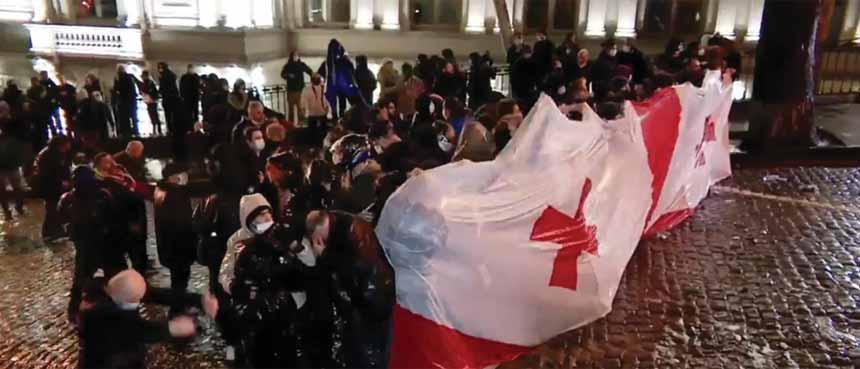
On February 14, 2023, the movement initiated a bill on the activities of foreignfunded organizations with the plan to register it officially in parliament. Georgian Dream agreed with this position. The draft law, if successfully adopted by the Georgian Parliament in the near future, would put CSOs in a vulnerable position.
If the Georgian Parliament adopts the law on agents of foreign influence, it will mark a decisive turn away from Georgia’s European integration and could negatively impact perspective for future European financial aid. In the frameworks of Expert Evaluation, GIP asked established Georgian and international experts if they agree or disagree with that notion.
Below are nine of the 29 answers provided.* Compiled by the team of the Georgian Institute of Politics.
HUBERTUS JAHN – PROFESSOR OF THE HISTORY OF RUSSIA AND THE CAUCASUS, UNIVERSITY OF CAMBRIDGE
This policy was first adopted and used in the Russian Federation. Its outcome there is for everyone to see. It has led to a complete dismantling of democratic and civil society structures and the rise of an autocratic and corrupt dictatorship, accompanied by numerous arbitrary punishments and incarcerations of innocent individuals. This policy stands diametrically opposed to legal practices and traditions of freedom in Europe. This will effectively stop the European integration process of Georgia (which may well be the intention behind the
proposed law in the first place). It will have serious long-term effects on Georgia’s economic prosperity and development, and it will negatively affect the aspirations of Georgia’s young and educated generation, many of whom may even consider leaving the country (just as in Russia).
STEPHEN JONES – DIRECTOR, GEORGIAN STUDIES PROGRAM, HARVARD UNIVERSITY
This is a provocative bill, and I hope it is decisively rejected by the Georgian parliament. It is modeled on the legislation of Russia and other authoritarian states. It is the beginning of a process which will chip away at the freedom of Georgia’s CSOs to freely organize without fear of government restrictions, and to express dissent. Georgian CSOs and their freedom of action are essential to the proper functioning of Georgia’s democracy. Without them, Georgia’s citizens will not have access to the informed analysis and commentary they require. But this bill, if it becomes law, will cast a deeper shadow over Georgia’s media and other parts of Georgian civil society. Anyone can be declared a “foreign agent;” it is an ominous reference to Soviet times when being “foreign” was dangerous. This bill is counter to Georgia’s aspiration for democratic openness, and will undermine the goal of EU membership.
JULIE GEORGE – ASSOCIATE PROFESSOR OF POLITICAL SCIENCE, QUEENS COLLEGE, CUNY
Laws on foreign influence are a way to isolate and harass civil society groups whose voices, while sometimes difficult to hear, are the essence of democratic governance. Democracies are difficult to govern. But they are the safest societies. Georgians deserve to live in a democracy. It could be that the current Georgian leadership does not intend to suppress voices, but merely mark them. Even so, in those countries that have created foreign agency laws, over time the power
of ALL civil society has eroded. Media freedoms have collapsed. Authoritarian regimes have emerged every time. This trajectory is well studied and well-known. This law, then, is not merely a law – it’s a signal to the West that Georgia’s efforts to build democracy have ended. The Georgian government will have abandoned its people, who have worked for so long and endured so much to build the promise of an open and safe Georgia.
LINCOLN MITCHELL –COLUMBIA UNIVERSITY
While passing such a law would not help Georgia’s European integration, many in Europe have already pushed Georgia to the back of the line, so passing a law like this will not be decisive in any way.
HELGE BLAKKISRUD –ASSOCIATE PROFESSOR, UNIVERSITY OF OSLO
To adopt a law ‘on foreign agents’ in the current situation would be to send a fundamentally wrong signal to Brussels and to European capitals. While across the European Union, member states are concerned about how external powers might seek to exploit domestic vulnerabilities through fake news and influence operations, a law on foreign agents as envisioned by the current proposal is not the way forward if Georgia is seeking further integration with the EU.
CHRISTOFER BERGLUND –ASSOCIATE PROFESSOR, MALMÖ UNIVERSITY
GD has time and again demonstrated that it has zero interest in ensuring rule of law. After cracking down against opposition politicians and critical media outlets, this draft law creates conditions for harassing CSOs too. It makes no sense for the EU to extend financial let alone political support to a state that demonstrates blatant disregard for its values.
STEFAN MEISTER – DGAP,
HEAD OF CENTER FOR ORDER AND GOVERNANCE IN EASTERN EUROPE, RUSSIA, CENTRAL ASIA
The current Georgian government has left the transatlantic and European integration path. Its actions against the media, undermining the rule of law and now the foreign agent law, are seen in Brussels and the EU member states as very critical, because all together it undermines key elements of integration with the EU. The foreign influence law reminds us of practices we know from Russia, which tries to minimize international contacts and funding for civil society. All this is about the control and isolation of society. For Georgia’s path to Europe, a vibrant civil society is crucial. International contacts are very important. A lot of activities are funded from abroad which are important to develop the human potential of the country, for education, international exchange, to keep young people which have very limited perspective in the country. Independent media is financed from abroad, which is not fueling polarization but provides fact-based quality information and investigative research. Many services for Georgian society are not funded by the Georgian state, but by foreign donors, first of all from Europe and the US. If all this is not possible anymore, the situation in society will worsen and more young people will leave the country. Such a law would undermine granting a candidate status for Georgia. Georgia had a strong image as a reform country in the past. It still performs best in many areas in reforms in the context of the Association Agreement with the EU. But that is a legacy from the past. Without rule of law, independent media, free and fair elections and strong civil society, no EU integration for the country will be possible. Georgia’s big assets in the past two decades were its openness to foreigners and vibrant civil society. Such a law will destroy this important advantage Georgia has with regard to many other post-Soviet countries, and will bring it closer to the Russian political culture and repressive policy. Russia will only become weaker and lose more influence with its war against Ukraine. Any rapprochement with Russia and compro-
mise, any disinformation campaign in line with Russian narratives, will have not only a negative impact on the political culture of the country, but will burn bridges towards European and transatlantic integration. I can only confirm this from my talks with Brussels institutions and in the member states. A big shift is going on in the perception of Georgia, and this law and anti-Western and antiEuropean narratives and policy is very distractive.
THOMAS DE WAAL – SENIOR FELLOW, CARNEGIE EUROPE
This proposed legislation has echoes of Russia’s “foreign agent law” and, if passed, would clearly do a lot of damage to Georgia’s European aspirations. But let’s be clear on what this is really about. This initiative is very unlikely to pass and is better seen as a deliberate provocation. It’s the work of a group of politicians who have no interest in Georgia joining the EU and who want to advance their agenda and gain fame by picking a public fight with Western politicians. Caution, restraint and skepticism which do not give these provocateurs too much “oxygen of publicity” are needed in coordinating the response.
GIORGI ISAKADZE – HOST & EDITOR AT BMG, EDITOR IN CHIEF AT FORBES GEORGIA
I do not see strong institutions in Georgia that would be capable of revealing “agents of influence” in the country, which falls more into the realm of intelligence services and law enforcement rather than political connotation. The latter could skillfully be used as a political tool to damage the reputation of certain people unacceptable to the government. The contents and name of the initiative evoke direct association with the existing Russian legislation, under which hundreds of people, who were in any way unacceptable for the regime, were labeled “agents of foreign influence” and registered as foreign.
*Find the full report on the GIP website

GEORGIA TODAY MARCH 10 - 16, 2023 4 POLITICS
The March 7 protest on Rustaveli Avenue. Image source: Mtavari Arkhi
The South Caucasus Risks Ending Up as Collateral Damage from the Russo-Iranian Alliance
ANALYSIS BY SAAHIL MENON
Pariahs around the globe – from North Korea to Syria to Eritrea to Venezuela – find themselves forcibly thrust into the Kremlin’s orbit after being sanctioned to the hilt and cut off from capital markets. Make no mistake, however; Iran is arguably the motherlode of malignant forces out there owing to how dangerously interwoven fundamentalist Islam is with the tyranny its clerics exercise over the public at large. Whether Russia or China is the lesser of two evils vis-á-vis posing an existential threat to the free world remains up for debate, given the comparatively greater geopolitical clout they wield. That said, and by virtue of their socialist past, religion has historically taken a back seat and had no real bearing on internal governance. The Iranian populace, on the other hand, has been dealt an exceptionally raw deal by the zealots who usurped power back in 1979. Besides the masses having their most rudimentary civil liberties withheld, women in modern-day Iran contend with gender apartheid and settle for second-class status at best within an inherently chauvinistic society. Far from being brushed aside as a domestic affair, the ongoing nationwide demonstrations this time around were a major wake-up call for Western powers that have long championed female empowerment yet buried their heads in the sand with respect to Iran. If anything, Tehran brazenly throwing its weight behind Moscow in the way of drones supply and technical assistance illustrates the Ayatollahs’ penchant for sowing chaos well beyond the immediate neighborhood. The Islamic Republic shares land and sea borders with 13 other countries – all of whom are fair game for a theocratic regime bent on expanding its sphere of influence. In particular, the Persian Gulf sheikhdoms next door have repeatedly sounded the alarm over the Iranian ruling elite seeking to “export their revolution” by any means necessary. Having failed to do so at the height of the Arab Spring, when regime change was ripe for the picking, or in the decade thereafter, Iran’s sights are now firmly set on the strategicallylocated South Caucasus.
Already on a collision course with Azerbaijan over the latter allegedly redrawing borders in the aftermath of the 2020 Nagorno-Karabakh conflict and inciting a separatist movement among Iran’s 30-million stronghold ethnic Azeri minority, the hardline government of President Ebrahim Raisi is not one to let such antagonism slide and carry on with business as usual. The armed attack on Azerbaijan’s embassy in Tehran last month is widely believed to have been an inside job, not least since the subsequent investigation carried out by local authorities remains shrouded in opacity, while the assailant appears to have gotten away scot-free. The common denominator at play when it comes to petty sabre-rattling by the Islamic Revolutionary Guard Corps (IRGC) and their surrogate militia across the region is Israel. It is no secret that bilateral ties between Baku and Tel Aviv have scaled new heights and taken on a multifaceted dimension of late, so much so that Azerbaijan recently inaugurated its first diplomatic mission to Israel. Clearly, the very notion of a fellow Shia-majority jurisdiction cosying up to so-called “little Satan” ruffles the feathers of Iran’s jingoistic mullahs. Israel, renowned for its cutting-edge innovation
and state-of-the-art military equipment, is ramping up weapons sales and sophisticated spyware provision to the Azerbaijanis with the goal of countering a mutual foe. Meanwhile, Iran’s intelligence apparatus has an oven-ready pretext to launch a cross-border insurgency in the name of protecting national security –not dissimilar to the Kremlin’s nuclear blackmail aimed at dissuading NATO allies from arming Ukraine. Supreme leader Ali Khameini vowed to exact revenge for the 2020 assassination of Quds Force commander Qasem Soleimani, and has kept the world guessing as to what his next “chess move” will be. Adamant that the US-led taking out of his closest confidante in Baghdad had all the earmarks of Mossad involvement together with Azerbaijan’s fairly sizeable Jewish community may render it fertile ground for long overdue reprisal.
Subverting dynastic rule in its backyard has been a key component of Iran’s clandestine foreign policy ever since the late Shah’s ousting. In the case of Saudi Arabia and the other five GCC monarchies, Tehran’s paranoia stems from their neighbors’ territory being used as a launching pad to propagate American and Zionist interests throughout the Middle East. Needless to say, Azerbaijan is a whole new ball game from the IRGC’s vantage point. The Aliyev family has been at the helm ever since Azerbaijan’s independence in 1991 and run the resource-rich Caspian nation like its personal fiefdom. Admittedly, it is not Baku’s kleptocracy or crony capitalism that the Iranians take issue with so much as their constitutionally-enshrined principle of secularism. While most Western observers hail Azerbaijan as a bastion
of modernity which does not impose a draconian variant of Sharia law on the masses, Iran sees these liberal policies through an entirely different prism –namely a Soviet-legacy clampdown on religion with the baton merely passed down from one generation to the next. All the more worrisome is that Iranian youth are beginning to look northwards and appreciate the sheer freedom as well as the peace dividend they could potentially enjoy once their country is bereft of fanatical leadership.
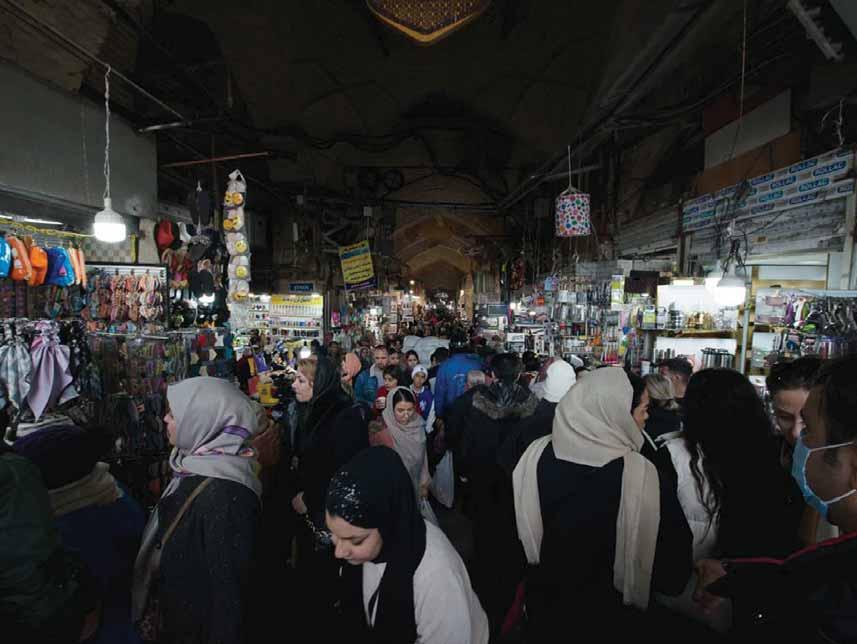
Under normal circumstances, big brother Russia would never entertain the prospect of a third party breeding extremism in the post-USSR space. However, Azerbaijan has made no bones about turning its back on Moscow, whom they do not consider an honest broker in their territorial dispute with Armenia. Worse still, there is overt receptivity by both sides to Brussels supplanting the Kremlin as the chief mediator. It is worth recalling that earlier this year, Armenia even declined to host military drills by the Russia-led Collective Security Treaty Organisation (CSTO) – a sorry excuse for a bulwark to NATO, whose only function thus far has been quashing largescale demonstrations in a handful of ex-USSR republics. In essence, President Vladimir Putin has come to a de facto memorandum of understanding (MoU) with Iran that was established with his strongman ally Ramzan Kadyrov following the Second Chechen War, specifically that Jihadists have free reign to run riot within their own respective confines, so long as this radical movement does not spill over into the Russian Federation proper. With Iran fast emerging as an indispensable partner in the midst of
Russia’s de-dollarization agenda, and a counterweight to prevent Turkey from turning a “brotherly” state into a quasiprotectorate, Putin is content to look the other way and sign off on the Iranians cutting Azerbaijan down to size.
As for Georgia and Armenia, they are both virtually signatories of their own death warrants. The laissez-faire approach taken by these two governments towards the uncontrolled influx of Russian draft dodgers will come home to roost sooner or later. Despite Tbilisi’s macroeconomic indicators looking promising in the last quarter, the capital injection from this new wave of unvetted arrivals has not trickled down to Georgian commoners – most of whom are far worse off in real terms and barely managing to keep their heads above water with the skyrocketing cost of living. The extent to which Georgia’s “European perspective” has dimmed, courtesy of the current administration’s soft spot for Russia and the cabal of tertiary sector war profiteers, is an especially bitter pill to swallow for the country’s Europhile citizenry.
An almost identical phenomenon exists in Armenia, which finds itself smackbang on the Russian exodus belt and now plays host to a disproportionately large diaspora of Putin’s foot soldiers. It would be premature to think that budding Iranian exiles are not taking note of the ease with which they can simply breeze into Georgia or Armenia visa-free under the guise of opposing their regime. Akin to the detrimental impact the 2015 refugee crisis had Western Europe’s tourism industry, an overrepresentation of Russians is slowly but surely robbing both fiercely patriotic nations of the authenticity and demographic homoge-
neity they pride themselves on. Now that Tehran’s complicity in the war is out in the open, it makes little sense for the collective West to wait until the 25th hour before enforcing appropriate deterrence measures. Seeing as Iran is nowhere near as deeply integrated in the global economy as the likes of Russia or China, and carries out direct trade with just five countries according to its Chamber of Commerce, there should be nothing stopping G7 members from throwing the kitchen sink at the Ayatollahs in a bid to starve their state coffers of all viable income streams. The European Union has a golden opportunity to make amends for its botched response to Russian aggression by ruthlessly going after Iran and, by extension, putting a spoke in the wheel of pet projects like Beijing’s Belt and Road Initiative (BRI) and the International North-South Transport Corridor, which Indo-Russian relations hinge on going forward. At the same time, there are telltale signs of supposedly neutral states gravitating towards the Ukrainian camp purely out of spite for Iran – be it the recent visit of Saudi Arabian foreign minister Prince Faisal bin Farhan Al Saud to Kyiv, Pakistan sending military aid to Ukraine, or Israel voting in favor of a UN resolution a couple of weeks ago demanding the withdrawal of Russian troops from Ukraine. The net negative of being in cahoots with another empire-building behemoth suggest that it is only a matter of time before the chummy IranRussia rapport comes to blows. Should this fallout transpire, Transcaucasia will pay the heaviest price and emerge as the most likely proxy battleground in which differences are aired.
GEORGIA TODAY MARCH 10 - 16, 2023 5 POLITICS
The economic reality of Iran plays out in Tehran's Grand Bazaar, seen here in February 2023. Photo by Marjan Yazdi for NPR
CSCE Senior Policy Advisor Michael Hikari Cecire on Georgian Dream’s Chance to Turn It Around
 INTERVIEW BY VAZHA TAVBERIDZE
INTERVIEW BY VAZHA TAVBERIDZE
It's clearly an attack on Georgia’s EuroAtlantic choice, an attack on Georgia's democracy, an attack on Georgia’s strategic partnerships with the West, and an attack on the Georgia and US bilateral relationship. It's also quite self-evidently, an expression of deference to Moscow and an alignment with Russian interests in the region, - CSCE Senior Policy Advisor Michael Hikari Cecire tells RFE/RL’s Georgian Service of the controversial law that was set to be imposed this week.
“Legislation like this is so painfully undemocratic,” he notes. “What it does is signal the ruling party's willingness to undermine and attack all elements, all institutional edifices, of the remnants of Georgia democracy. It's not just the law itself which is abysmal, it’s really an assault on the last redoubt of independent thought in Georgian society, and that's civil society and the media. It also signals a willingness to turn the power of the state against any other forms of independent or democratic expression.”
Michael Hikari Cecire joined the US Commission on Security and Cooperation in Europe (CSCE), where he focuses on the South Caucasus and Black Sea regional affairs, as a senior policy advisor, in 2021. Previously, he was an analyst at the Congressional Research Service, before that serving as a policy advisor, strategic researcher, and Eurasia regional analyst supporting the Department of Defense and other US government agencies. We sat down with him to discuss the foreign agents bills the Georgian Dream ruling party were set to put into force this week. The interview took place before the party offered to withdraw the bills following 48 hours of protest and rioting.
ONE OF THE ARGUMENTS WE’VE HEARD FOR THOSE SUPPORTING THESE BILLS IS THE VERY SAME ARGUMENT THAT RUSSIA USED BACK IN 2012 TO INTRODUCE A SIMILAR LEGISLATION: “WELL, IF THE US HAS IT, WHY CAN’T WE?” WHAT DO YOU THINK OF THESE COMPARISONS? DOES THE US HAVING FARA JUSTIFY GEORGIA DOING WHAT IT'S DOING?
What is clear is that the Georgian Dream political leadership isn't even bothering to offer their own independent, even bad faith, arguments for this law. They are just aping Russian arguments that were made about their law, and Azerbaijani arguments about their derivative law, demonstrating their fealty to Moscow and a lack of independent thought even to create their own separate narrative. It's very sad to watch that play out. I don't think most Georgians are buying it, though, because it's so blatant and so unoriginal. And for the record, I think it is worth saying that this has nothing to do with FARA, which is a very narrow bit of legislation and really only covers those who are working for and on behalf of foreign governments and foreign political parties. It's really speaking to
lobbyists in particular, to represent these interests, and has nothing to do for the most part with civil society or the media.
THERE IS A SENSE IN SOCIETY THAT, SHOULD THIS LAW PASS, IT WOULD MERELY BE THE START OF A PATH TO SOMEWHERE BAD. WHERE DOES THAT PATH LEAD?
Crossing that line is an opening to other sorts of law or actions that can really radically transform Georgia from an imperfect but vibrant and pluralistic democracy, into a fully autocratic and perhaps even authoritarian country, and one in league with Russia. And as such, because Russia has no allies and only vassals, essentially a tributary to Moscow.
If all your nominal partners in the West, and all of those whose counsel you should be heeding domestically, are telling you not to do it, then that means your partnership and your source of counsel is coming from elsewhere. And that elsewhere is quite evidently Russia. The rationale for this is unclear, and there are a number of potential reasons this may be the case, but none of them are good, and none of them are satisfactory in terms of why Georgia should be going down this route.
WHAT CAN OR SHOULD THE WEST DO ABOUT IT?
I think that we need to do what we are doing, which is to make it very clear that this is an attack on not just our relationship, and not just on the will of the Georgian people, but also an abrupt and deliberate shift into Moscow's column.
It's clear to me that they don't care very much about the health or maintenance of Georgia’s democracy, per se, or even about Western integration, and this is also something that could make a lot of things that we previously never would have entertained suddenly possible, such as the elimination of a lot of support for Georgia's participation in western forums and the travel, prestige
and attention that comes with it. It also means potentially that certain people are going to start for the first time genuinely entertaining the thought of what individual sanctions might be considered and on whom they should be levied. The democracy support is not going to end. It may have to change, but it's not going to end. But you know, the way we support other elements in Georgia, particularly the way we support the state as a whole, may not be justifiable if the state is captured by a party that has become openly pro-Russian.
SANCTIONS WOULD MARK A GENUINE CHANGE FROM THE WORDS, HOWEVER CRITICAL, WE'VE BEEN HEARING FOR YEARS NOW, TO A WHOLE NEW PHASE OF ACTUALLY DOING SOMETHING. WHAT WOULD THOSE ACTIONS BE?
AND HAD THE WEST DONE IT YEARS AGO, COULD THIS HAVE BEEN PREVENTED?
I've been very open about the fact that I was not comfortable with sanctions in the past. In the past, sanctions were not the right move, because it seemed to feed into the worst paranoid tendencies of the Georgian Dream leadership; the idea that we are actively trying to undermine them and overthrow them. A lot of those perceptions led us to where we are today.
In the past, I was not supportive of sanctions, but actions do have consequences, and this descent into full and open alignment with Moscow is an attack on Georgia's democracy, and it represents a point we cannot hope for something better to come out of; we can't hope that carrots and incentives can turn things around by themselves. Instead, we have to make it clear where we stand. And we stand with the Georgian people. We stand with Georgia's democracy.
I think that certain sanctions might be considered- not in the sense that “we are going to do it because we want to,” but to make it very clear that a line has
been crossed, or is going to be crossed, beyond which only dark things exist. There is this idea that the US has been trying to overthrow Georgian Dream, which is patently false. And there's this idea that there have even been shadow sanctions related to this Credit Suisse business, which is also patently false. We haven't done anything. In fact, we've been remarkably nuanced and remarkably restrained, in many respects.
WOULD THOSE SANCTIONS INCLUDE INDIVIDUAL SANCTIONS ON THE BIG ELEPHANT IN THE ROOM THAT MIGHT WELL BE BEHIND ALL OF THIS?
Everything would be looked at. Absolutely. But one thing that's important to say is that nothing is irreversible. And as bad as things are, they don't need to go further. And there is a path back to friendship, cooperation.
EVEN WITH GEORGIAN DREAM?
If they are able to demonstrate a genuine willingness to come back and not take this authoritarian term, then why not? But they have to make that part clear; we have to really see it. Under those conditions, the US and Georgia still have a potentially very bright future, and there is a possibility of great bilateral relations. We can go back to that. That’s my hope, but the ball is in their court.
DOES THIS NOT REMIND YOU OF THE WEST’S INCESSANT ATTEMPTS TO FIND MUTUAL GROUND WITH PUTIN OVER THE YEARS?
No, because I think Russia has never not been an empire. And Russia, in every political expression, has been a violent and poorly oriented empire. In Georgian Dream, there's clearly a difference in its sliding into subservience to Moscow. But it wasn't all that long ago that we had a very productive and good relationship with the Georgian Dream government, when Margvelashvili was president and Kvirikashvili was prime minister. It wasn't perfect, but no country that we work with is perfect. Not even our own. So I don't think there's anything necessarily inherent. It’s the same with the UNM – it’s not necessarily an authoritarian party because they took an authoritarian turn at some point. They also did a lot of good, and we also had a great relationship with them at times.
We have to be open minded, and we certainly shouldn’t be writing off an entire party if they're genuinely willing to return to their democratic obligations. But until that happens, it's all rather academic, unfortunately.
GEORGIA TODAY MARCH 10 - 16, 2023 6 POLITICS
Retired British Major-General Clive "Chip" Chapman. Source: thetripgroup.com
We have to make it clear where we stand. And we stand with the Georgian people. We stand with Georgia's democracy
We shouldn'tcertainly be writing off an entire party if they're genuinely willing to return to their democratic obligations
The Tenth Package of SanctionsOne Year of Russian Aggression
BY DAVIT SHATAKISHVILI FOR GFSIS
On February 25, the European Union approved the 10th package of sanctions against Russia, precisely one year since the unprovoked and unjustified Russian invasion of Ukraine began. They claim Moscow is now waging war not only on the battlefield, but also by attacking civilians and non-military infrastructure. According to European Commission President Ursula von der Leyen, this is the toughest package of sanctions the EU has adopted so far. The sanctions put Russia's economy in a desperate situation, severely restricting its potential for military or technical recovery. The EU continues to reaffirm its unwavering support for Ukraine, and says it is ready to continue providing political, financial, military and humanitarian assistance to it as long as is needed. It is interesting to discuss what the EU’s 10th package of sanctions includes, and analyze the one-year consequences that the Russian economy has faced through the unprecedentedly tough steps taken by the Western partners.
WHAT DOES THE 10TH PACKAGE OF SANCTIONS INCLUDE?
Sanctions were extended to exports from the EU to Russia, mainly affecting technological components and industrial goods, with a total value of 11 billion Euros, on top of the 32.5 billion Eurosworth of goods sanctioned so far. These restrictions include electronics, specialized vehicles and spare parts for aircraft engines. Components needed by the Russian military industry, such as antennas, cranes, compasses and radars, were also targeted. An additional 96 organizations linked to Russia's military industry were added to the sanctions list. Moreover, the EU banned the export of dualuse and high-tech goods to Russia. The restriction affected 47 new electronic components used in the production of Russian drones, air defense systems and helicopters. This limitation also applies to “rare earth” elements and thermal cameras. According to the European Union, they have banned all technical products found on the battlefield. Since the entry into force of the 10th package of measures, the EU has already sanctioned about 49% of its exports to Russia.
The new package of sanctions was also applied to imports from Russia to the European Union. Prohibited goods include bitumen and related materials such as asphalt and tar. Imports of synthetic rubber and carbon blacks have also been banned. In total, the import value of the mentioned goods is about 1.3 billion Euros, which comes on top of the 90 billion Euros-worth of imported goods sanctioned so far. Currently, in total, the EU has sanctioned about 58% of its imports from Russia.
According to Ursula von der Leyen, the European Union has extended Russian sanctions to include third countries. For example, Iran’s Revolutionary Guard actively is supporting Russia's war and is supplying Moscow with Shahed drones to attack civilian infrastructure in Ukraine. As a consequence, the EU imposed sanctions on seven Iranian companies and individuals involved in the supply of military drones and various technical components to Russia, making them subject to a ban on the sale of such goods to Russia. The European Union has announced that the list may be expanded to Iranian business entities and representatives of other countries that supply similar equipment to the Russian Federation. This should be a strong deter-
rent for other companies and international traders not to support the Russian aggression by helping it to circumvent the sanctions.
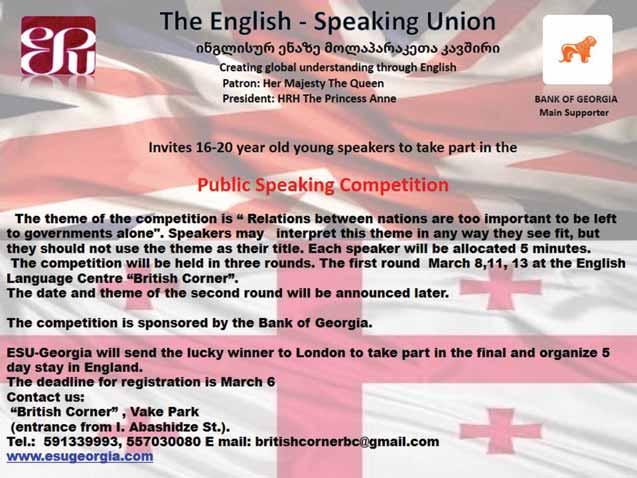
In addition to the military and economic restrictions, the EU's 10th package of sanctions targets an additional 120 individuals and organizations accused of both war crimes and spreading Russian propaganda. The new restrictions also affect two Russian propaganda broadcasters. According to the European Union representatives, Moscow is actively using media propaganda and disinformation networks, and it is crucial to apply sanctions on the people involved in this process.
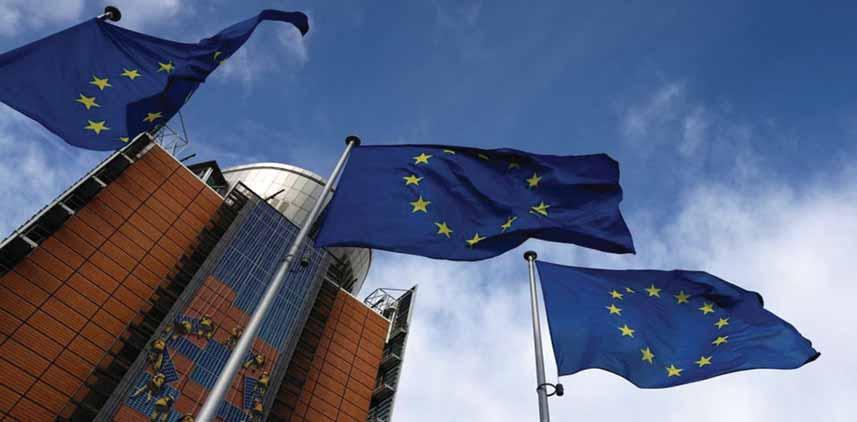
The package also expands controls on sanction evasion. Euro bloc leaders say they are tracking Russian oligarchs trying to hide or sell their assets to avoid the sanctions. They say they will also overview the frozen assets of the Russia Central Bank held in the European Union, and discuss the possibilities of reconstructing Ukraine with these funds. The EU plans to step up efforts to prevent sanction evasion as much as possible.
THE ECONOMIC EFFECTS OF SANCTIONS FOR RUSSIA OVER THE PAST YEAR
The primary goal of the sanctions is to financially drain the Kremlin's war machine, as well as to hold accountable the political and military elites responsible for war crimes. The last year has, as a result, been difficult for the Russian economy. On the one hand, it had to wage an aggressive war in Ukraine, and on the other, to maintain economic indicators to create the effect of normal functioning. A clear example of this is that, according to Bloomberg, last year the Russian Ruble was one of the strongest currencies of the year. Obviously, this is due to the monetary decisions made by the Central Bank of Russia at the beginning of the war, as well as the colossal assets spent on maintaining the value of the national currency.
According to the International Monetary Fund (IMF), last year the Russian economy decreased by 2.2%, and according to the World Bank (World Bank) and the International Organization for Economic Cooperation and Development (OECD), economic decline was -3.5% and -3.9%, respectively. As for the 2023 forecasts, the IMF’s projection is a slight growth of 0.3% in Russia, while the World Bank and the OECD predict a decrease, by -3.3% and -5.6% respectively. Russia's foreign trade has also decreased. Accord-
ing to IMF data, last year Russian exports decreased by 16%, and imports decreased by 19.2%. The trend of export reduction is likely to continue this year and will drop by 3.4%, while import growth is expected to be 5.6%. As for the increase in prices, last year the annual inflation rate in Russia amounted to 13.8%, and according to the international organizations’ forecasts, the price level growth in 2023 will be determined in the range of 5-6%.
Last year, Russia's budget deficit amounted to $47 billion. According to the Ministry of Finance of Russia, in the current year, the budget deficit will be within 2% of the Gross Domestic Product (GDP). However, the oil price ceiling set at $60 by the G7 and EU member states will significantly reduce Russia's budgetary revenues. With the Kremlin’s spending remaining the same or even increasing, and its budget revenues reduced, the Financial Times estimates that Russia's budget deficit this year will be around 4.5% of the GDP.
Over the past year, all Western countries that were dependent on Russia for energy or other products have tried to
diversify their supply chains. In this regard, European countries achieved the greatest success and have almost completely stopped buying Russian energy resources, leading the Kremlin to lose its political and economic leverage over Europe. In this process, the ceiling price of oil also played an important role, significantly reducing Russia's income from energy resources. Currently, Gazprom's natural gas exports are at their lowest level since the collapse of the Soviet Union. The same can be said about Russian financial institutions, whose net profit decreased by about 90% last year. The above numbers allow us to draw general conclusions about the difficult consequences the Russian economy is facing.
* * *
The coordinated steps of the Western partners come late, but are still achieving their economic goals, which will hopefully have political consequences that will be reflected in the ending of the Russian aggression. The sanctions are working within their logical timeframes, with expectations about their
having immediate results clearly overstated. In the past year, the 10 packages of restrictions imposed by the European Union have targeted almost all of Russia's critically important industries, which has not only limited Russia's technical capabilities to wage its aggressive war in Ukraine, but also calls into question its recovery potential. The G7 and other partner states also joined the European sanctions. Alongside exhausting the Russian war machine, the financial and military aid to Ukraine is actively ongoing. During the last year, many countries have been able to reduce their dependence on Russia in various fields and diversify trade and economic ties. Additionally, the Kremlin is losing its political influence not only in Europe, but also in Asia, and the empty spaces left by it are being filled by other states. Thus, Moscow's global influence is being weakened by the day, and it is hoped that the Western civilized world will remain faithful to its principles and values, so that Russia not only suffers a severe defeat on the battlefield, but also in its aims to achieve its hegemonic intentions in the future.
GEORGIA TODAY MARCH 10 - 16, 2023 7 BUSINESS
Image source: REUTERS/Yves Herman/File Photo
At the Crossroads of Choices: When Too Much Is Confusing and Too Little Is Restricting. Part 1
rent international environment.
DEGLOBALIZATION OR GLOBALIZATION RESET?
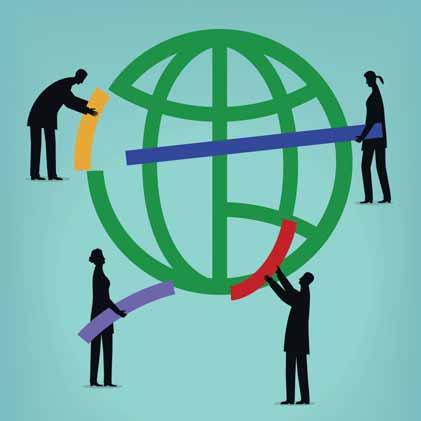
Image source: ted.com
BY VICTOR KIPIANI, CHAIRPERSON OF GEOCASE
It has been said many times in recent years that the old order is finally a thing of the past, but a new one, alternative and truly effective, has yet to be established. Today, we also know (although some will probably argue with us) that the old system is not only disarmed in the face of the current multifaceted crisis, but cannot even theoretically formulate an unambiguous answer to all the acute questions in this poly-crisis environment. The expectation that economic integration at the global level, and the networking of the world with trade links, would be an effective prevention of conflict and extremism has proven to be an illusion. The crisis in international relations caused by the pandemic has confronted the entire security system with one very specific, inevitable and most fundamental challenge. This challenge is called self-reformation, and it is in itself the
kind of danger that a system of any kind that is in the process of necessary reformation, in the absence of good governance and balanced priorities, may not be able to overcome at all.
Though it is a fact that the process of realignment has begun and the variations of a possible future world order are to be outlined, it is also clear that it is premature to talk about the final contours of this or that variation, at least until the redistribution of power in Europe as a result of the war in Ukraine has happened, as has the rebalancing of power in the Pacific and Indian Ocean basins. Presumably, these two geographic centers will determine the establishment of a new balance of "world domination" in the Eurasian space. However, the available factual and theoretical material allows us to make some observations. We will now set out to share this observation with our readers.
Before broadening the topic, we believe it would be useful to highlight several important factors characteristic of the context that emerged in the wave of the establishment of a new order in the cur-
Regardless of how the question is posed, one of the critical trends of the incipient new (dis)order can be seen right on the surface. First of all, it is the structuring of the system of relations in the postCold War period, the characteristics of which can be summarized as follows: More regionalization. We have more than once said that the new "systemic" order will be characterized by enlargement and strengthening of the role of established regional geopolitical centers. And international relations of the new model will largely rely on such regional "gravitational clusters," and the relative global stability and predictability of events in the area of a major regional center will be based on the interdependence of such major centers. We can already see the regional networking (hub-and-spoke setup) in terms of security and economy in the form of a number of defense and trade alliances. Today, the large Black Sea region is already referred to as one of the main regional hubs of this new "system". This trend of regionalization will deepen even further in the foreseeable future, since the force that will turn this process around is not yet evident. As a result, the degree of the new interconnectedness of the global (dis)order will be manifested in the degree of interconnection and interaction of major regional geographical-political centers.
Economic self-sufficiency: This is a case that is referred to differently in different sources, be it "economic nationalism," "concern for one's own average citizen," "protectionism," "new economic isolationism," or others. In any case, this phenomenon implies less dependence on unreliable or unfriendly foreign geographies of production or supply (if possible, even complete withdrawal from them), strengthening one’s own economic sustainability in the conditions of said regionalization, and ensuring the functioning of a crisis economy with one’s own (domestic), self-sufficient infrastructure and human capital.
It is likely that a slowdown in the transition to so-called ecological capitalism, a reduction in the consumption of oil and natural gas, will be associated with the same factor. Particular attention should be paid to structural problems
in the Chinese economy, which against the background of deteriorating demographics and increasing social obligations will have a direct impact on the global economic (and not just economic) situation.
A turn toward realism: That is, a reality in which unconcealed or not so skillfully concealed self-interest is the main driver of decision-making. Behind the scenes, international relations have never been devoid of conjunctural interests. However, recent processes show that doing business on the world stage will become even less ideological, and the principle of trade off, the same as transactionalism, is likely to be elevated to the level of public policy. And Georgian politics must adapt to this reality and equip itself with the appropriate skills to realize the national ego (more security/better economy).
The power factor: Since the end of the Cold War, the overt use of force to advance one's own interests or influences has increased again. The expenditure of resources on improving weapons or modernizing defense forces is reaching new heights. It is indicative that even when the issue is still being discussed at the diplomatic level and has not entered the "hot phase," there is still a chill of the possible use of force in one context or another. Indeed, a relationship based on realism, along with other related principles, assumes that the weak hear the voice of the strong, listen and, when necessary, adjust to it. At the same time, as long as there is no proper authoritative "higher authority" in the universe for the just resolution of conflicts, and international law has no power other than moral law, physical resources or kinetics once again become a factor to be reckoned with. This, too, is a sad reality with which the Georgian political process will have to face up to, continuing to maintain and adapt proper state systems in accordance with it.
Security in a broad sense: In our time, security has practically gone beyond the understanding associated with "armor" and has moved into a much broader dimension. The reasons for this can be found primarily in the change and diversification of threats. As a result, if we only go beyond the narrow content of defense and the armed forces, the socalled "armor security," we will see a number of such challenges, the failure
Envisioning a New World Order
ANALYSIS BY EMIL AVDALIANI
What kind of new world order can we expect?
Will the world’s biggest states work together to shape it?
Before delving into thoughts on that future world order, it should be mentioned that beyond the large states and global corporations which will work toward it, the factor of human agency is also important, though often impossible to determine. Personalities and their ideas will matter, and, as such, building that future order will be a difficult and competitive process, and challenging to predict with any accuracy.
Signs of erosion of the post-Cold War world order are unmistakable. The changes in the present global balance of power are twofold. First is horizontal, which involves the return to normalcy of the economic and political strength of the Asian states, headed by China. Second is a vertical shift caused by liberal overextension, as well as multiple changes, such as those in technology, which enables non-state actors to become geopolitically disruptive.
Though the disappearance of the Soviet rival power ideally should have propelled
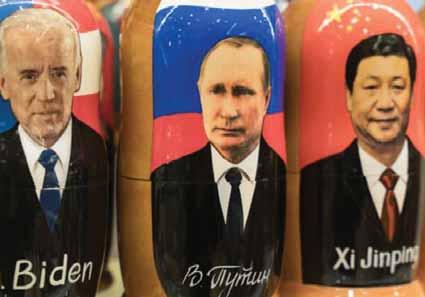
Image source: ovidzha/shutterstock
the long-term uncontested US-led world order. In reality, America’s unipolarity and overextended liberal order have ultimately undermined its power. America’s unrivaled economic and military prestige, which freed it from operating exclusively within the agreed-upon norms it had established, has turned against it. Its long-time allies and partners no longer see the necessity in strictly abiding by Washington’s rules. Thence come vacil-
lations within US alliances, and turbulence on the world stage that challenge the very premises of US power and the liberal idea.
The emergence of a new world order is inevitable. The coming system is going to be less US-driven and more chaotic. But having an imperfect world order is still more effective than having no order at all. Even a troubled order can be worked on and perfected over time with
to meet which directly harms national security. It is our internal conviction that the main challenge in this regard is poverty and social inequality, which can be exploited by an external aggressor and which also provide fertile ground for internal extremism. This is easier to assume when one considers the unconventional nature of contemporary conflict, where one does not have to shoot a bullet to achieve an objective. The variety of methods available today, from cyber sabotage, to the overt or covert use of trade sanctions, to the manipulation of public attitudes through disinformation, can offer an attacker a far more effective route to the desired malicious goal. Among the security vulnerabilities, energy and food supply, as well as a lack of state spirit and proportional restraint in the media, are particularly noteworthy. Thus, in terms of the old and new nomenclature of security risks, from Georgia's point of view, it will again be crucial to coordinate reliably the three-member system already mentioned: Proactive diplomacy, prevention-oriented intelligence services, and soft power projection mechanisms.
Convergence of systems of governance: Perhaps one of the most controversial and contradictory trends is that different political systems (except, of course, the outright authoritarian ones) are moving toward each other. As a result, we will have more similarities than differences between these systems over time. Elements of similarity (a kind of convergence) should be sought mainly in the de-ideologization of decisionmaking, as well as in practical actions aimed at ensuring quality of life and security (broadly speaking). It is clear that this will be a very long and difficult process. It is also evident that the deterioration of the security environment and the manipulation of the political agenda will be the main obstacles to this process. However, it is just as likely that the understanding of the image and reputation of public administration will change fundamentally here again: Such image and reputation will be measured mainly by governance, measured by concrete results and by the effective provision of relevant services (economic opportunities, social equality, personal security) by the state to the citizenry.
Continued in next week’s GT.
efforts backed by sufficient military power. The construction of a new order will follow the logic of previous orders. It will reflect the then existing balance of power. Great powers generally build an order which fits into their interests and aspirations. But often not all great powers agree upon a set of rules. Those who oppose will tend to create an alternative vision. This means that orders are also inherently incomplete. There are always loopholes which cause divergencies from an established set of rules. Incompleteness brings about debates on the need to re-invent or renegotiate the principles of the system. In a way, the world order cannot be static in itself. Its unchanging nature would doom its operation. This also means that the present evolution toward a new world order is a natural, evolutionary move. What is more or less established is that though there might be a disagreement on which power, China or the US, will be sufficiently stronger to claim primacy on the world stage, a broader agreement exists among scholars that the future world order will revolve around these two powers. This does not rule out the emergence of multipolarity, but the latter could be an extremely uneven one, where Russia, India and others will serve as geopolitical poles, but with significantly limited capabilities in comparison
with China and America. The regional orders that Moscow, Delhi and others build will, to a certain extent, have to reflect Beijing or Washington’s geopolitical interests.
Nevertheless, the US power, however diluted it will be and heavily blunted by various actors, is likely to remain fundamental over the next decades. There is a growing likelihood of America trying to limit its commitments in various far-flung lands and instead recalibrate its foreign policy toward big challenges. This will go hand-in-hand with a growing emphasis on a major advantage the US still has: A string of trusted allies. Despite vacillations, the connections are strongly underpinned by liberal-democratic solidarity.
Connected to the likely re-emergence of spheres of influence is the return of the great power competition, a resurgence of authoritarianism which now molds into illiberal challenge undergirded by capitalism—the weapon usually associated with liberalism. The great power competition also means that in the future world order, the collective West will no longer face a singular threat, but rather a set of interlinked global challenges. Mounting a resolute response will be doubly challenging, but not impossible, as the reaction to the 2022 Russian invasion of Ukraine has shown.
GEORGIA TODAY MARCH 10 - 16, 2023 8 BUSINESS
"Something Delicious" - Carrefour Congratulates Mothers on March 3 with a Unique Book of Recipes
Video recordings will be published on social networks. A digital version of the book is also available for the general public on the website 3march.clp.ge.
"Something Delicious" was created as part of the March 3 campaign of
media and digital communications agency "Clipart". The company has been implementing the project since 2018, and every March 3, it congratulates mothers through unique gifts of different themes.
Carrefour, owned and operated by Majid Al Futtaim in Georgia, is celebrating the achievements of women and their vital role in society throughout March.
In addition to offering various discounts and offers to customers throughout the month, Carrefour has also created a special book for them with diverse and useful recipes.

To mark the occasion of Mothers’ Day, Carrefour created a unique book of recipes entitled “Something Delicious” and sent it as a gift to Carrefour employees and mothers working in different fields. Famous Georgian chefs contributed to the book, which includes more than 65 recipes of children’s favorite dishes in the country.

All these recipes will be introduced to customers individually through social media and every month will be brought
to life by the chefs during the live cooking at Carrefour.
“One of the most enjoyable processes for the Carrefour team is creating great moments. With the gift prepared for March 3, we wanted to make this day more colorful and give another unforgettable moment to mothers. We hope that ‘Something Delicious’ will make children fall in love with cooking and make playing with ingredients in the kitchen, something mother and child can enjoy together,” says Nino Ramishvili, Head of Marketing and Strategic Communication Department of Carrefour.
Before creating the book, mothers were asked about their children's favorite dishes. The answers were summarized and given to the authors of the book, chefs Ia Dzagania, Dimitri Rcheulishvili, Nutsa Surguladze, Manji, and culinary platform Food4.ge.
“’Something Delicious” was created for every mother, and we are confident that mothers will find at least one of their child’s favorite dishes in this book. Carrefour is a champion of supplying healthy and quality products, and so it was important for us to strike the balance in the recipes between taste and health benefits. We believe this book is a testament to that,” Ramishvili adds. "Something Delicious" consists of several parts, and includes breakfast, main dish and dessert sections, as well as grill and birthday menus.
The purpose of the variety of recipes included in the book is to make it easier for parents to prepare something delicious for their children at any time and in any situation.
As an initiative of Carrefour, Live Cooking will also be organized, where these renowned chefs will prepare their recipes in the presence of the guests.
ITB Berlin 2023 Celebrates Georgian Hospitality, the “Trademark” of the Country
of Messe Berlin, said choosing Georgia as the Host Country of the event had been an “excellent choice."
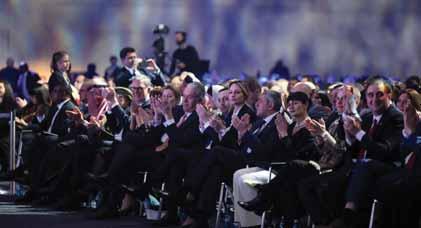
Ruetz told the media that he is convinced that Georgian hospitality will “win all our hearts here at ITB.”
“I’ve personally been to Georgia and have experienced what it means to be a stumari [guest] in Georgia. I’m convinced that Georgian hospitality will win all our hearts here at the ITB. It was an excellent choice to have Georgia chosen as the official host country of ITB Berlin 2023, which is the largest tourism and travel professional gathering in the world. We are welcoming 5000 exhibiting companies from 161 countries, and one country always stands out. This is Georgia, this year. I’m looking forward to making many new business contacts, but especially to feel Georgia in all senses and to make many new friends,” he noted.
The Georgian PM at the ITB 2023 opening. Source: gov.ge
Georgian Prime Minister Irakli Garibashvili officially opened ITB Berlin 2023, the world’s largest tourism trade fair, at Georgia’s exhibition stand.

A major international tourism fair running in the German capital and featuring Georgia as this year’s Host Country, ITB highlighted hospitality as a “trademark” of the country to an audience of 2,500 during the opening event.
Hosted at CityCube Berlin, the opening gala also involved Robert Habeck, the German Vice Chancellor and Federal Minister for Economic Affairs and Climate Action, Berlin’s Governing Mayor Franziska Giffey, and Dirk Hoffmann, the Managing Director of Messe Berlin fairgrounds.
"Only a small part of the history and
great culture of our unique country is represented here, the Georgian PM noted.
“We hope this will inspire you to visit Georgia and get to know better our picturesque nature, great history and culture – and most importantly – hardworking, open-hearted and infinitely hospitable Georgian people.
“When meeting a Georgian, or visiting a Georgian family, one will meet a phenomenon that is the leitmotif of our entire history – Georgian hospitality.
“Those who have already been to Georgia are familiar with this phenomenon and know that Georgian hospitality is truly boundless.
“As the Georgian expression goes, a guest is a Gift of God. We perceive guests as gifts sent by the Lord Almighty and give them the best we have.
“One of the most important works of Georgian literature – the epic story of “Guest and Host” by monumental Georgian poet and writer Vazha Pshavela, describes this very tradition – an implicit, but binding rule for everyone in Georgia.
“Of course, hospitality is a characteristic feature of every nation, but for Georgians, it is an inviolable and untouchable living tradition that defines our identity, despite the changes in time and circumstances. This unique feature of the Georgian character has not disappeared even in the most difficult and dramatic periods of history.
“We have a special role to play as we are guests in Europe and, at the same time, we are hosting you on behalf of Georgia. This is a huge honor!"
David Ruetz, the Senior Vice President
The Exhibition Director of ITB Berlin, Deborah Rothe, also expressed delight at welcoming Georgia as this
year’s host nation.
“I had the chance to explore Georgia. Georgia has a lot to show to the tourism industry. I admire this host culture,” she said, adding that “Georgia is the hidden gem of the world.”
Vice Prime Minister, Minister of Economy and Sustainable Development, Levan Davitashvili, said he believes this status is a recognition that tourism is one of the main priorities of Georgia.
“Located between Europe and Asia, Georgia seamlessly integrated aspects of various cultures while maintaining its identity. With tourism, trade, energy and connectivity, the country enjoys all the benefits of being located at the crossroads of civilizations. It has emerged as a dynamic country with a strong commitment to building a modern, competitive economy and an attractive business environment for local and foreign investors,” the Economy Minister said.
Find out more about the 2023 event at facebook.com/ITBBerlin
GEORGIA TODAY MARCH 10 - 16, 2023 9 BUSINESS
ITB Berlin 2023 opening. Source: gov.ge
Tame Meta Team, Mate?
and ice still have new things to show me. I expect that this will continue as long as I’m alive. We still have Ushguli and Mestia on the agenda: Former hosts who remain good friends; museums; watchtowers; landscapes and villagescapes. Hopefully, Ushba will grace us with his stern beauty, visible from so many locations on our route. They film me, I write about and photograph them, and the circle continues. There is water running into the house, somewhat to my surprise as we hardly go through one of these long cold seasons without it freezing at some point and now running again until April maybe. It actually did freeze a few weeks earlier (despite keeping a tap running a bit), as our renter this year, the new English teacher replacing Lali at the school here, informed us. I was not expecting to see it during this visit, and told my crew not to expect flowing water in the house at all. But here we are, here it is, and it’s all better than expected.
wife and I are close with; they’re having a small supra (feast) with guests so we, having just lunched ourselves, don’t stay past a cup of coffee.
We break into two groups, each shooting its own video. I climb to rescue the other group’s drone, which fell into and was embraced by a tree. The weather is nicely cooperative, mixes of cloud and sun, a few degrees above freezing. I don’t find any new snow or ice dragons this time, but do point out plenty of snow breakers frozen crashing over the tops of fences, which are also part of the dragons’ life cycle. Likely the most common part, it seems.
BLOG BY TONY HANMER
This is me typing my new article for GT. We’re getting quite meta here (as in “about”):
I have a film crew up with me from Tbilisi, and they’re making a documentary about me as an artist in a few media, including word. We are in
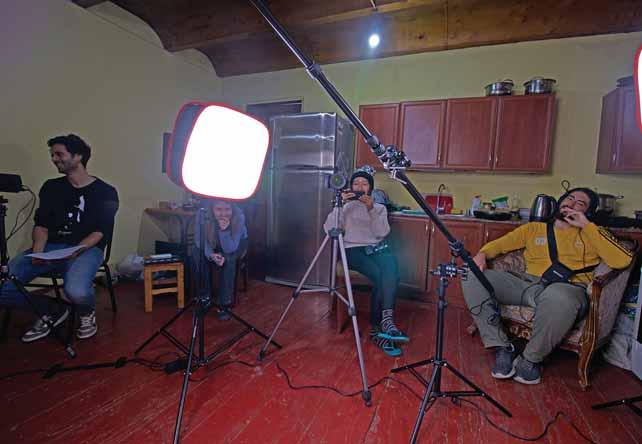
Svaneti, in my village of Etseri, in the house I have lived in for 13 years with my wife.
As Svaneti has been the biggest part of my creative life (well, my life in general) these years, the director decided he couldn’t do this film without this huge part. So here we are. It’s late winter, early March, one of my best seasons for photography, and even today, after the last two years of revelations of snow and ice leading to a whole slew of fantastic sto-
ries from what I’ve discovered, there is more. The texture of the whole area of snowfields I see from any window is magnificently rippled, like whole scapes of frozen waves, but gentle ones. Not running perpendicular to the hill slopes, but running down them, so it’s not from melting snow slumping; more likely a wind phenomenon. While they’re filming me, or between breaks, I rush around to the various 2nd-story windows and get my still shots, delighted that snow
True, the generator I urged them to bring, specially bought for the occasion, has proved utterly useless: It has a weird plug outlet which resembles nothing I know of (Australian, maybe, or more likely Chinese? Who knows!). But electricity, fickle at best in winter, has been on MOST of the time, and so far our lights and other electronica are working. We are being careful to keep things charged for the likely inevitable down times; bedroom doors shut at all times to keep that precious radiator heat where we need it; the Svan wood stove, the beast, fired. We spend a day walking around the village after my main interview. I take photos and explain my process, or attempt to. Meet people, surprised to see me, and move on. I take them to see a family my
Etseri’s huge wide open spaces will soon give way to the comparatively busy streets of Mestia and the much narrower, closer ones of Ushguli, smallest of the communities we’ll visit. I don’t usually make such epic voyages in such deeply wintery conditions, but for this film, snow up here was to be an important element, my main muse in Svaneti of late years. I’m not allowed to see the “dailies,” raw video of each whole day’s shooting, so have to content myself with my own work, which is interesting enough. Turmoil awaits us back in Tbilisi, I know, when we return in a couple of days. Until then, it’s all reunions and calm. Good to see you again, my Svaneti. Back in mid-May.
Tony Hanmer has lived in Georgia since 1999, in Svaneti since 2007, and been a weekly writer and photographer for GT since early 2011. He runs the “Svaneti Renaissance” Facebook group, now with nearly 2000 members, at www.facebook.com/ groups/SvanetiRenaissance/
He and his wife also run their own guest house in Etseri: www.facebook.com/hanmer.house.svaneti
Georgia: Still Struggling to Shake off the Memory of Josef Stalin
for the anniversary of his death see no issues in that.
Stalin played a key role in the invasion and occupation of independent and democratic Georgia in 1921, and historians say this resulted in the extermination of hundreds of thousands of Georgians. Yet his supporters’ admiration of him is so intense that they refuse to accept the criticism of the 1930s Great Purge in which “saboteurs” were imprisoned, tortured and jailed.
“The majority of Georgians believe Stalin defeated fascism, and this is what matters most,” Davitashvili said before his death. “And life was cheap and affordable too, back then.”
70 years ago, when Stalin died, Washington's "1203 Restaurant" treated guests to free borscht. Yet, in Gori, Georgia, the veterans still come out and celebrate his memory
 BY HELENA BEDWELL
BY HELENA BEDWELL
Georgia, a small Caucasus nation of 3.6 million, is having a difficult time shaking off the memory of Josef Stalin, especially those in his birthplace, the town of Gori, where even today you can still find fans.
Josef Stalin is sadly alive and kicking in his home country of Georgia, 70 years after his death, thanks to such admirers. The former Soviet leader’s stern features still stare out from the windows of the country’s souvenir shops; his statues still stand in parks and village squares; in
Tbilisi, visitors still flock to see the collection of Ushangi Davitashvili, who was an admirer of Stalin and created a substantial collection of artefacts in his honor. He always said that Stalin should be remembered, if not worshipped, as a strong statesman and Georgian hero.
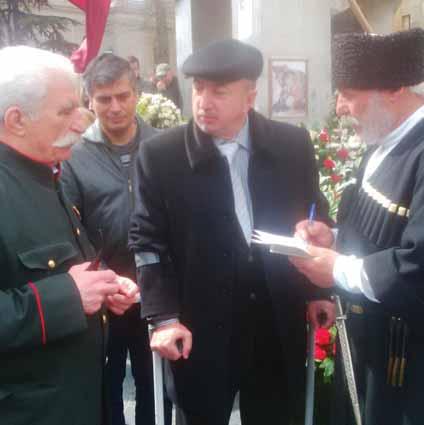
Ushangi died a few years ago, and now his elderly wife and daughter are continuing to care for the collection, which is open to visitors.
Yet, opponents of the tyrant have in the past sought to topple his statues and in some cases have covered them in paint, only to see them restored.
This conflict of opinion mirrors the Black Sea country’s political divisions, disagreement on how to attract visitors,
and its relations with neighboring Russia, which is also divided on Stalin’s legacy.
“Stalin was among the most bloodthirsty dictators in history,” political expert Giorgi Kandelaki says in an interview in Tbilisi. “The problem is that many people in the present government ‘Georgian Dream’ coalition genuinely think he was a good guy.”
Meanwhile, at Davitashvili’s home in Tbilisi, Stalin is always present: A huge portrait of the benign general secretary hangs in the living room, and their garden is full of replicas of Stalin’s achievements, with items from Stalingrad and all over the former Soviet Union, as well as a model of the house where Stalin was
born in Gori.
“Ushangi died, but we cannot simply get rid of his collection and forget about his adoration of Stalin,” his daughter Ketevan says. Ushangi’s wife brings me a handful of black and white photographs to show just how much blood and sweat were spent creating this tiny museum.
Stalin was born Josef Jughashvili. His mother was religious, and he won a scholarship to the Tiflis Seminary. He was later expelled and discovered the ideals of Karl Marx. Sadly, many religious people today are told by their priests that Stalin’s doctrine was not as bad as it is made to sound today. You can even
find icons featuring Stalin as a saint, and many of the veterans who come to Gori
Nikita Khrushchev, who won the power battle that followed after Stalin’s death, told a 1956 party congress that the Stalin had ordered the execution of thousands of loyal communists. As such, Georgia followed Russia in trying to erase Stalin’s image. Stalingrad and smaller cities were renamed, his ashes were removed from the Kremlin Wall, and portraits were taken down. Yet Georgia’s parliament voted to ban Soviet symbols only in 2011, 20 years after the country declared independence. A bronze Stalin statue was secretly dismantled overnight in his home town of Gori in June 2010 and moved to the gardens of his Soviet-era built museum.
Stalin isn’t a figure to be revered, although the sale of Stalin memorabilia continues. This is done mainly for profit, designed for tourists who may not understand the background and history of Georgia and its association with the mass murderer Stalin.
Daniel Hamilton, a British consultant of economic and political matters who often visits Georgia for work and leisure, tells us he thinks the sale of Stalin memorabilia is “tacky, vulgar and offensive. Stalin isn’t a figure to be celebrated; he’s one that ought to be denigrated. Georgia has so many things to be proud of, but its association with this genocidal mass murderer isn’t among them.”
GEORGIA TODAY MARCH 10 - 16, 2023 10 SOCIETY
The Expat Lifestyle: Judoka Tania Morgenstern, Cancer Survivor and Inspiration to Many, on her Journey to Self-Mastery
 INTERVIEW BY KATIE RUTH DAVIES
INTERVIEW BY KATIE RUTH DAVIES
Our new regular column
“The Expat Lifestyle” sees us out and about meeting expat business owners who have chosen to make a life in Georgia. We’ll be finding out about their lifestyle, hobbies, culture, likes and dislikes about Georgia, and how this life compares with that abroad. For our latest interview, GEORGIA TODAY sat down with judoka Tania Morgenstern, mother-of-two, inspiring cancer survivor and owner of Gymnasia, a space that helps people to be their best.
WHAT BROUGHT YOU
TO GEORGIA?
Georgian culture, nature, and the free spirit of Georgian people always amazed me. Since I was a judoka myself, what brought me to Georgia was Georgian judokas and their belief system.
Judokas from Georgia are like bumblebees. Using the laws of physics, it would seem impossible for bumblebees to fly, yet they continue to defy the odds. Similarly, Georgian judokas have overcome many obstacles to achieve success in their sport. Despite the relatively small size of the country and its lack of resources, Georgian judokas have been able to become the leading team on the world stage.
The Georgian judo fighters I’ve encountered were not just brave and skillful, they also had an incredible dedication and winning spirit. This inspired me to believe in myself, and this is actually
what brought me here.
TELL US ABOUT YOUR BUSINESS AND BACKGROUND IN THE FIELD.
We all know how difficult it is to reach our maximum physical and mental potential in today's busy and stressful world.
I know this all too well. I used to train regularly, but when my son was born I struggled to balance the demands of training myself and putting time into taking my son to train. This led me to come up with the concept of Gymnasia, where my family and I could train together, enjoy quality time, eat, and socialize, without having to waste time in traffic.
Gymnasia provides a supportive environment for members to learn, grow, and reach their goals. Gymnasia provides a much-needed space for people to come together and support each other in reaching their goals. It's a place where people can come to relax, have fun, and learn how to live healthier lives. I'm proud to have created this space and I'm excited to see what our members can achieve.
TELL US ABOUT YOUR FAMILY. ARE THEY ALSO THRIVING HERE IN GEORGIA?
I’m from Tel Aviv. I have two children, one daughter and a son. My husband works on a TV channel and was born and raised in Tbilisi. My parents also live here, and my children love to spend time after school at Gymnasia. I feel great pride and happiness watching them spend quality time with me in this space. My son goes to the British Georgian School. Before that, he finished an English kindergarten, followed by German
preschool and first grade. Today my 8-year-old son speaks English, German, Georgian and Russian. My son’s friends are all mixed, usually kids who speak at least two languages. I doubt I would be able to provide him with such a language experience if I lived in Israel. I remember when my son was three and said “Я Georgian!” It was so funny but also it was the essence of what he is. A few months ago, I took him to Israel. Although he doesn’t speak Hebrew, he felt at home, as I’m constantly feeding him with Israeli culture as well. I want to take him to summer camp in Israel this year.
WHAT ARE YOUR MAIN LIKES HERE?
I feel like Georgia connects people from all over the world. As Georgians say "Tbilisi is a connection" and I totally agree. I already managed to create deep and different kinds of connections- this is my most important experience here. I love Georgian nature and I love that every corner of Georgia feels like a home to me.
TELL US ABOUT YOUR BATTLE WITH CANCER.
When I got diagnosed, the first thing I did was to call my two best friends. They both had some connections in the medical sector, and I quickly found a Georgian surgeon and, after some thought, had surgery here. I actually think it was done very well. For the treatment, though, I was advised to go abroad, not just for technical reasons but also for physiological reasons. I needed to change my environment, and I didn’t want to stay home in case I wasn’t well- I didn’t want
my son to see me like that.
If I could change anything about the Georgian healthcare system, I’d ask for a more positive attitude from Georgian doctors. Here, I felt like they pitied me; in the Spanish clinic I went to, one which was suggested by my other friend, I felt really comfortable and felt their positive vibe.
I had great support from the people I met here in Georgia; my friends, my clients, just people who I’d met only a few times; Sami Cohen, who suggested his InsideMyself seminar to me- a seminar with which I started my self-mastery journey, and which gave me the strength to overcome the challenge life gave me; my husband, who supported me endlessly. And then Igor Konunchenko, who came up with the idea to create the project Gymnasia and invited me to do it. He gave me the opportunity to do something that I’d wanted to do for a long time, to manage and create something big. I think the support of all those people saved me, and I can’t be grateful enough.
WHAT WOULD YOU CHANGE ABOUT GEORGIA IF YOU COULD? COMPARE IT TO WHERE YOU LIVED PREVIOUSLY. It appears that many people are not look-
ing ahead, taking the necessary steps to protect their environment and create an attractive living space with well-maintained buildings and cities. A stark comparison can be found where I lived in Tel Aviv, Israel, which is working now on the concept of closing its center to cars; to replace them with a city train, scooter, and bicycle infrastructure. Unfortunately, Tbilisi’s infrastructure is not very user-friendly, leading to increased traffic and a complete lack of playgrounds and trees, pathways and quiet places. We must take a more long-term approach to investments and planning, rather than simply focusing on the present moment. Otherwise, our environment will become a mess. Without sustainable planning there can be no sustainable future.
HOW DO YOU SEE GEORGIA A FEW YEARS FROM NOW? ARE YOU HERE FOR THE LONGTERM, DO YOU THINK?
In this tumultuous political climate, it’s hard to predict what is to come. With all my being, I wish for Georgia to be blessed with peace, prosperity, and independence. I am creating my life and building my projects here and hope to remain, doing whatever I can to contribute to this process. I will be here for as long as I see being able to do so.
PUBLISHER & GM
George Sharashidze
COMMERCIAL DEPARTMENT
Commercial Director: Iva Merabishvili
Marketing Manager: Natalia Chikvaidze
EDITORIAL DEPARTMENT:
Editor-In-Chief: Katie Ruth Davies
Journalists: Ana Dumbadze, Vazha Tavberidze, Tony Hanmer, Emil Avdaliani, Nugzar B. Ruhadze, Michael Godwin, Ketevan Skhirtladze, Mariam Mtivlishvili, Erekle Poladishvili
Photographer: Aleksei Serov

Website Manager/Editor: Katie Ruth Davies
Layout: Misha Mchedlishvili
Webmaster: Sergey Gevenov
Circulation Managers: David Kerdikashvili, David Djandjgava
ADDRESS 1 Melikishvili Str.
Tbilisi, 0179, Georgia
Tel.: +995 32 229 59 19
E: info@georgiatoday.ge
F: GeorgiaToday
ADVERTISING & SUBSCRIPTION
+995 555 00 14 46
E-mail: marketing@georgiatoday.ge
Reproducing material, photos and advertisements without prior editorial permission is strictly forbidden. The author is responsible for all material. Rights of authors are preserved. The newspaper is registered in Mtatsminda district court.
Reg. # 06/4-309
GEORGIA TODAY MARCH 10 - 16, 2023 11 SOCIETY GEORGIA TODAY







 BY ANA DUMBADZE
BY ANA DUMBADZE
 COMPILED BY ANA DUMBADZE
COMPILED BY ANA DUMBADZE




 INTERVIEW BY VAZHA TAVBERIDZE
INTERVIEW BY VAZHA TAVBERIDZE









 BY HELENA BEDWELL
BY HELENA BEDWELL

 INTERVIEW BY KATIE RUTH DAVIES
INTERVIEW BY KATIE RUTH DAVIES



